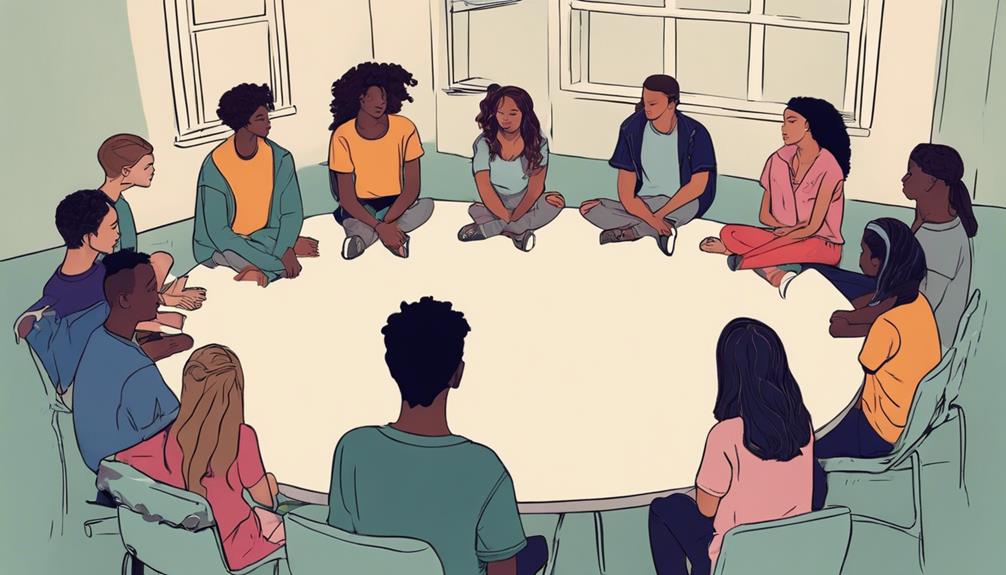Studying the obstacles encountered by teenagers coping with divorce shows that utilizing various healing techniques tailored to their individual needs greatly improves their emotional well-being and resilience.
By implementing strategies such as therapeutic support groups, cognitive-behavioral techniques, art and play therapy interventions, family counseling, and mindfulness practices, professionals can offer essential tools for adolescents to navigate the challenges they face.
These approaches not only address immediate concerns but also lay the groundwork for long-term emotional growth and stability in adolescents dealing with the aftermath of divorce.
Key Takeaways
- Therapeutic support groups and family counseling offer emotional support and combat loneliness.
- Cognitive-behavioral therapy equips adolescents with coping skills and challenges negative thought patterns.
- Art and play therapy interventions aid emotional processing and coping strategy development.
- Mindfulness and relaxation techniques help manage stress, regulate emotions, and build resilience.
Therapeutic Support Groups for Adolescents
In therapeutic support groups for adolescents navigating through divorce, we create a safe space for sharing experiences and emotions with peers who are facing similar challenges. Divorce can be a turbulent time for children, leaving them grappling with a whirlwind of emotions. These support groups offer a lifeline, a place where adolescents can find understanding and solace amidst the chaos. By participating in these groups, children learn valuable coping skills, gain emotional support, and combat feelings of loneliness and isolation that often accompany the breakdown of their parents' relationship.
As facilitators guide discussions and provide coping strategies, adolescents begin to see that they aren't alone in their struggles. Through interaction with peers who share similar experiences, they build connections that help them navigate the complexities of divorce. Research underscores the positive impact of these support groups on mental health outcomes, showing that adolescents who engage in such programs experience improved psychological well-being and better adjustment to the challenges brought on by their parents' separation.
Cognitive-Behavioral Therapy Techniques

Navigating through the challenges of divorce, adolescents benefit greatly from cognitive-behavioral therapy techniques that focus on changing negative thought patterns and behaviors. Cognitive-behavioral therapy (CBT) equips adolescents with coping skills, problem-solving strategies, and emotional regulation tools to navigate the complexities of divorce. By identifying and challenging distorted thinking associated with the divorce, adolescents can develop healthier responses and enhance emotional well-being. This therapeutic approach often involves role-playing, relaxation techniques, and cognitive restructuring to effectively manage stress and anxiety during this tumultuous time. Research indicates that CBT techniques play a vital role in reducing depressive symptoms and enhancing overall mental health outcomes for adolescents coping with divorce. Through CBT, adolescents can acquire the necessary tools to confront their negative emotions and thoughts, fostering resilience and adaptive coping mechanisms.
| CBT Techniques for Adolescents Coping with Divorce | Benefits |
|---|---|
| Role-playing exercises | Enhances social skills and communication |
| Cognitive restructuring | Challenges negative thought patterns |
| Relaxation techniques | Promotes emotional regulation and stress management |
| Problem-solving strategies | Develops effective coping skills and resilience |
Art and Play Therapy Interventions
How can art and play therapy interventions empower adolescents to navigate the emotional challenges of divorce?
Art therapy and play therapy offer valuable ways for adolescents to engage in creative expression and emotional processing, aiding them in developing coping strategies and fostering emotional healing. Here's how these interventions can benefit adolescents:
- Creative Expression: Through art therapy, adolescents can use various artistic mediums to express their emotions visually, helping them communicate feelings that may be challenging to articulate verbally.
- Emotional Processing: Play therapy provides a non-threatening environment where adolescents can explore their emotions through play, enabling them to make sense of their experiences and feelings related to divorce.
- Coping Strategies: Both art and play therapy interventions equip adolescents with tools to enhance emotional regulation, reduce stress, and promote resilience as they navigate the complexities of divorce.
Family Counseling and Mediation Services

Through family counseling and mediation services, we aim to create a supportive environment where adolescents can openly address their emotions and work towards constructive resolutions amidst their parents' divorce. These services offer a safe space for adolescents to express their feelings and concerns, helping them develop coping skills and communication strategies to navigate the challenges of divorce. Mediation services play a crucial role in resolving conflicts related to custody, visitation, and communication post-divorce, promoting cooperative co-parenting and enhancing the overall well-being of adolescents. Family therapy sessions focus on rebuilding trust, improving communication, and strengthening relationships within the family unit. By addressing specific issues and providing guidance on how to manage conflicts effectively, family counseling and mediation services empower adolescents to adapt to the changes in their family dynamics with resilience and support.
| Family Counseling | Mediation Services | Adolescents |
|---|---|---|
| Safe space for | Resolve conflicts | Express feelings |
| Emotional expression | Custody decisions | Develop coping skills |
| Communication skills | Visitation agreements | Strengthen relationships |
Mindfulness and Relaxation Strategies
Incorporating mindfulness and relaxation strategies can greatly benefit adolescents coping with divorce by helping them manage stress and regulate emotions effectively. Here are three ways these techniques can support teens during this challenging time:
- Mindfulness Techniques:
Practices like deep breathing and meditation can assist adolescents in reducing stress levels and navigating overwhelming emotions that often accompany divorce. By incorporating these techniques into their daily routine, teens can enhance their emotional regulation skills and experience a sense of calm amidst the chaos.
- Relaxation Strategies:
Teaching methods such as progressive muscle relaxation and guided imagery empowers teens to cope with the emotional turmoil stemming from their parents' divorce. These strategies provide adolescents with a toolbox of techniques to help them relax, unwind, and find peace during turbulent times.
- Therapy Sessions:
Integrating mindfulness and relaxation practices into therapy sessions can aid adolescents in developing resilience, self-awareness, and adaptive coping skills. By incorporating these techniques into their therapeutic journey, teens can learn healthier ways to navigate the complexities of divorce and safeguard their mental well-being.
Frequently Asked Questions
What Type of Therapy Is Best for Children of Divorce?
For children of divorce, therapy that suits their needs varies. Seeking what resonates with their emotions and experiences is crucial. It's about finding the right fit, whether it's through play, family, group, cognitive-behavioral, or psychoeducational therapy.
What Are Coping Methods for Helping Children Adjust to Divorce?
When helping children adjust to divorce, we prioritize open communication, consistency in routines, and supporting relationships with both parents. Letting kids share their feelings and seeking professional help can give them tools to cope effectively.
What Are Some Coping Methods for Dealing With Divorce?
Dealing with divorce involves engaging in therapy, embracing self-care activities, expressing emotions through journaling or confiding in someone, practicing healthy communication with family, and seeking guidance from professionals who specialize in adolescent divorce to promote resilience.
What Is Most Important in Helping Children Cope With Divorce?
In helping children cope with divorce, providing emotional support, maintaining routines, encouraging positive relationships with both parents, respecting their feelings, and modeling healthy coping mechanisms are crucial for their well-being and adjustment during this challenging time.
Conclusion
As we journey through the challenges of divorce, we can find solace in the support and tools available to us. By embracing therapeutic support groups, cognitive-behavioral techniques, art and play therapy, family counseling, and mindfulness practices, we can navigate this difficult time with strength and resilience.
Let's lean on each other, explore new paths to healing, and emerge from this experience stronger and more connected than before. Together, we can weather any storm that comes our way.










